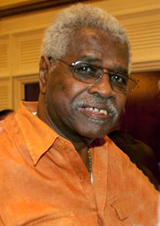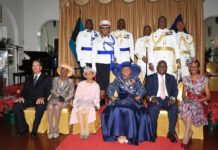
By Sir Arthur Foulkes
In 1682 John Sheffield, an English soldier, nobleman, adventurer, politician and poet, wrote a fairly long poem entitled Essay on Poetry. Centuries later, the opening lines of that work used to be carried frequently by Time Magazine as a filler. It goes like this:
“Of all those arts in which the wise excel,
Nature’s chief masterpiece is writing well.”
Paul Anthony White was many things, but above all he was a writer, devoted to the art with a passion approaching divine addiction.
As a fellow practitioner of the writer’s art, I enjoyed a friendship with Anthony better measured in decades rather than years, and I was privileged from time to time to collaborate with him in the political arena.
Everyone who is serious about the art of writing must also be a reader, a lover of language, with an insatiable appetite for literature. Anthony was all of that. He was well-read from the ancient classics to the modern masters.
His restless love affair with writing drove him to test his skills in every genre. He was attracted to wherever there were writers or a printing press: from The Herald to The Tribune to The Guardian to Punch.
He was at various times reporter, feature writer, publisher, political polemicist, speech-writer, poet and playwright.
But I believe he made his greatest contribution to Bahamian letters as a story-teller. He was a most talented short story writer, and his tales of Over-the-Hill — and in particular his beloved Grants Town – were as rich as any ever written.
Like all good writers, Anthony wrote about what he knew, and he knew Grants Town, its history and its people. This knowledge was infused with a combination of a keen sense of observation and at the same time an ability to convey a sense of identification with the narrative.
There was, of course, always more to be told. About two weeks before his passing he sent me by email his column for the week, which was really another delightful short story about Grants Town.
I pointed out to him what I thought was a very obvious omission. Contrary to popular belief, good journalists are the best keepers of secrets in the world outside the confessional, and all of us have confidences that will go with us to the grave.
This omission was not in that category at all, although it was about a rather sensitive matter. But I knew he never allowed that to deter him before. His reply to me was simple: “You write some – and you keep some!”
He did not want to overload or detract from that particular narrative but he would undoubtedly have returned to the missing piece at some other time — with the degree of attention it deserved.
He was, indeed, a chronicler par excellence of what Thomas Gray called “the short and simple annals of the poor” in one of Anthony’s favourite poems, Elegy Written in a Country Churchyard.
In Anthony’s expert hands these tales of Grants Town may have been short, but not so simple, and not so poor. In fact they were rich with the content of the hearts and souls of a colourful people.
I trust that it will be possible to have a collection of these wonderful stories of Grants Town published in one volume.
There was more than a little of the adventurer in Anthony. That is why he was able as a young man to seek knowledge, fortune and excitement in the great metropolis of New York.
That is why, too, as an older man he found himself in the middle of a coup d’etat in another country thousands of miles away from home.
Anthony was as colourful and quite as interesting as the people he wrote about, and with his passing The Bahamas has lost one of its finest practitioners of the writer’s art.
Joan and I extend our deepest sympathy to his children and relatives, and to the St. Agnes family to which he was so devoted. We share in your loss.
Now, may he rest in peace in “the bosom of his Father and his God”.







